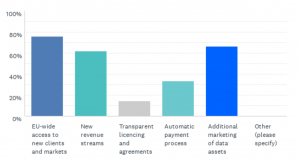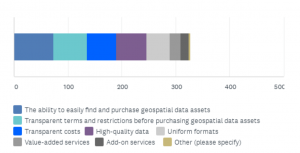Survey Insights (1) – Challenges of today’s geospatial market
17—Jun—2020, by Kathrin Lenvain

In Europe’s highly fragmented geospatial market, it’s time to implement the Digital Single Market and Data Economy in order to strengthen the continent’s approach to searching for and selling data on one central hub. The OpertusMundi marketplace is designed to put an end to the huge challenges faced by data owners and data consumers alike. In two surveys conducted from March to May, we asked data owners / producers as well as consumers to tell us about their major obstacles. The results indicate that there are plenty of challenges to take on, but also huge potential for our marketplace to create real benefits. Let’s take a more detailed look:
Everyday challenges for data owners
The challenges for data owners are manifold and cover all the aspects of their work, from market expansion and marketing to contractual matters and payment. Here are a few of the insights we’ve gained:
- Data owners tend to focus on one country (25%) because their clients are often located in one country (29%)
- Word-of-mouth still accounts for a huge part of promotion (77%)
- Catalogues are rarely available (68%), and the same is true of CMS setups for monitoring transactions (68%)
- Many still do not offer their data via a web service (40%)
- Data owners frequently spend a lot of time preparing contracts in accordance with clients’ needs (38%), and contracts are often only valid under the laws of the owners’ respective countries (38%)
- Few proactive measures are taken before assets are made available to the client (71%), and almost no monitoring takes place after the delivery of data (90%)
- Payments are still typically processed via direct transfers to bank accounts (90%)
Data owners consider the standardisation of pricing, contracts, and payments as major obstacles to participating in the marketplace.
The OpertusMundi approach
The marketplace will address all these problems. Through a central platform, it will offer expanded market outreach and be used to market data to clients worldwide. Data can easily be found through a catalogue, and owners can access transparent and detailed views of how and where their assets are commercially used – along with options to embed IPR protection measures during an asset sale. Owners can also automatically generate contracts in English in line with EU law. In addition, the platform will render payments to data owners electronically at competitive service rates to further minimise the effort required.
Everyday challenges for data consumers
When searching for data assets, the major challenges data consumers face are data availability (77%) a lack of information on the quality offered (62%) and licence / contract terms (52%). After purchasing data, they also have to deal with data-related issues such as completeness (61%), quality (60%), timeliness (44%), and errors (41%). Data consumers consider the standardisation of pricing (64%), the option to compare similar assets (58%), and the standardisation of contract terms (52%) as major obstacles to participating in the marketplace.
The OpertusMundi approach
The OpertusMundi marketplace will tackle these problems by minimising the effort required to compare assets, harmonising contracts, and establishing flexible pricing models and price points. Consumers will find metadata on the assets available in a catalogue, as well as recommendations based on their past searches and completed transactions, which will enable them to better evaluate asset quality.
95% interested in joining the marketplace
The great news: A vast majority (95%) of the participants in the two surveys is interested in joining the marketplace. More than 85% of participating data owners believe that the marketplace would increase their sales and revenue if their data assets were discoverable on a pan-European digital marketplace. Until now, the expansion to a wider geographical area and sector coverage have been major obstacles for companies. They consider the greatest potential benefits to be the following:
- EU-wide access to new clients and markets (76%)
- Additional marketing of data assets (66%)
- New revenue streams (61%)

Meanwhile, these are the greatest perceived benefits for data consumers and their organisations:
- Ability to easily find and purchase geospatial data assets (85%)
- Transparent terms & restrictions before purchasing data assets (74%)
- High-quality data (65%)
- Transparent costs (63%)
- Uniform formats (50%)

Stay tuned
The marketplace’s name will be announced this summer and its beta phase will start in early 2021.





